About us
IDN Global News
The Ban Treaty and the Nuclear-Armed States: From Irrelevance to a Game-Changer
By Alyn Ware
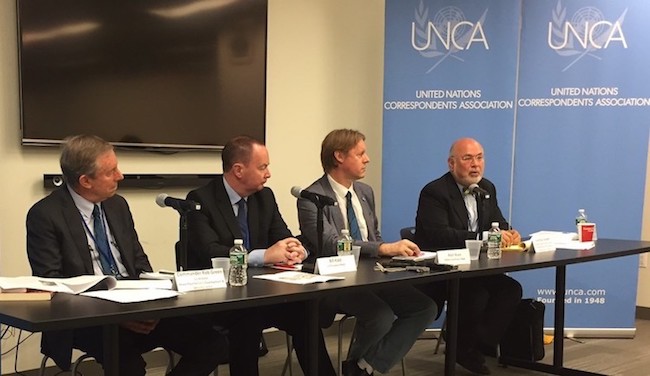
Alyn Ware, Global Coordinator of Parliamentarians for Nuclear Nonproliferation and Disarmament (PNND), examines how to use the ban treaty to impact on the policies and practices of the nuclear-armed States and their nuclear allies.
NEW YORK (IDN) – When the gavel came down at the United Nations on July 7 to confirm the adoption of the Treaty on the Prohibition of Nuclear Weapons, a cheer arose amongst the negotiating countries and civil society observers. 122 countries had voted in favour of the treaty, demonstrating a clear and unequivocal acceptance of the majority of UN members never to use, threaten to use, produce, possess, acquire, transfer, test or deploy nuclear weapons.
Will this be the game-changer that will finally lead to achievement of that elusive goal of global nuclear disarmament – a goal agreed by the UN unanimously in its very first resolution on January 24, 1946?
The Ban Treaty and the Nuclear-Armed States: From Irrelevance to a Game-ChangerRead More »
Amendment to the Treaty on the Prohibition on Nuclear Weapons
Amendment to the Treaty on the Prohibition on Nuclear Weapons proposed by the Netherlands
(‘Temporality clause’)
Article 1 is not compatible with our commitments as a member of NATO, should Article 1 not narrow its scope. We therefore propose the following text proposal to be added as a paragraph 1.3 in order to bring the text in line with security policies that combine a role for nuclear weapons with the goal of complete nuclear disarmament. In addition, the paragraph would strengthen the ties between this instrument and the NPT.
Amendment to the Treaty on the Prohibition on Nuclear WeaponsRead More »
Veterans Ask U.S. to Sign UN Treaty Abolishing Nuclear Weapons
By Brian Trautman, Gerry Condon, Samantha Ferguson
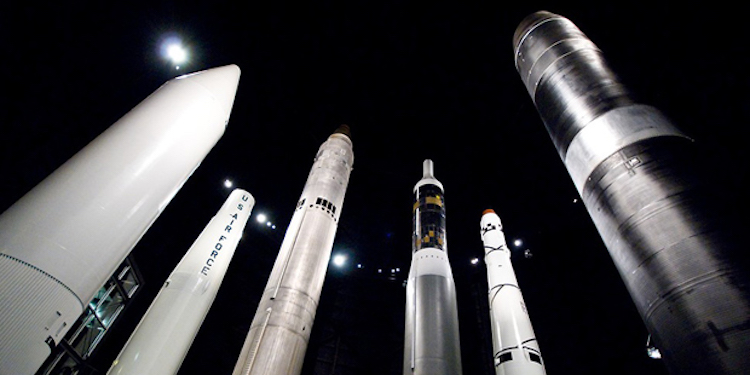
NEW YORK | SAN FRANCISCO | ST. LOUIS (IDN) – On July 7 2017, the United Nations, in a historic decision, approved a legally binding instrument to ban nuclear weapons, the Treaty on the Prohibition of Nuclear Weapons. Months of negotiations involving over 130 countries began in March 2017, culminating in a final draft endorsed by 122 countries. The treaty marks a significant milestone to help free the world of nuclear weapons.
The treaty emphasizes “the catastrophic humanitarian consequences that would result from any use of nuclear weapons.” It forbids participating states “to develop, test, produce, manufacture, otherwise acquire, possess or stockpile nuclear weapons or other nuclear explosive devices.” Additionally, it explains that the complete elimination of nuclear weapons from international arsenals “remains the only way to guarantee that nuclear weapons are never used again under any circumstances.”
Veterans Ask U.S. to Sign UN Treaty Abolishing Nuclear WeaponsRead More »
What After the Adoption of the UN Nuclear Weapons Ban Treaty
By Susi Snyder

Susi Snyder is the Nuclear Disarmament Programme Manager for PAX in the Netherlands. She has published numerous reports and articles. She is an International Steering Group member of the International Campaign to Abolish Nuclear Weapons (ICAN), and a 2016 Nuclear Free Future Award Laureate. Previously, Mrs. Snyder served as the Secretary General of the Women’s International League for Peace and Freedom (WILPF). – The Editor
UTRECHT, The Netherlands (IDN) – It’s nearly impossible to believe: nuclear weapons are banned. Outlawed. Making their way to where they belong, the dustbin of history. Since July 7 2017, that is a new reality. There is now a treaty that makes it illegal to make, have, get or use nuclear weapons. But what’s the next step for the nuclear ban? [P 13] CHINESE TEXT VERSONPDF| JAPANESE TEXT VERSONPDF|KOREAN TEXT VERSONPDF
What After the Adoption of the UN Nuclear Weapons Ban TreatyRead More »
Democracy at the UN: 122 Nations Vote to Ban the Bomb
By Alice Slater*
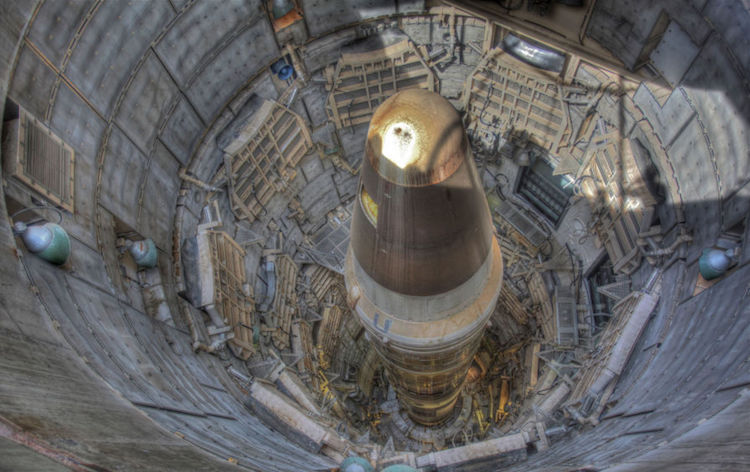
NEW YORJ (IDN-INPS) – On July 7 2017, at a UN Conference mandated by the UN General Assembly to negotiate a treaty to prohibit nuclear weapons, the only weapons of mass destruction yet to be banned, 122 nations completed the job after three weeks, accompanied by a celebratory outburst of cheers, tears, and applause among hundreds of activists, government delegates, and experts, as well as survivors of the lethal nuclear bombing of Hiroshima and witnesses to the devastating, toxic nuclear-test explosions in the Pacific.
The new treaty outlaws any prohibited activities related to nuclear weapons, including use, threat to use, development, testing, production, manufacturing, acquiring, possession, stockpiling, transferring, receiving, stationing, installation, and deployment of nuclear weapons. It also bans states from lending assistance, which includes such prohibited acts as financing for their development and manufacture, engaging in military preparations and planning, and permitting the transit of nuclear weapons through territorial water or airspace.
Democracy at the UN: 122 Nations Vote to Ban the BombRead More »
NATO, OSCE Asked to Pursue Nuclear Disarmament in Europe
By Jutta Wolf
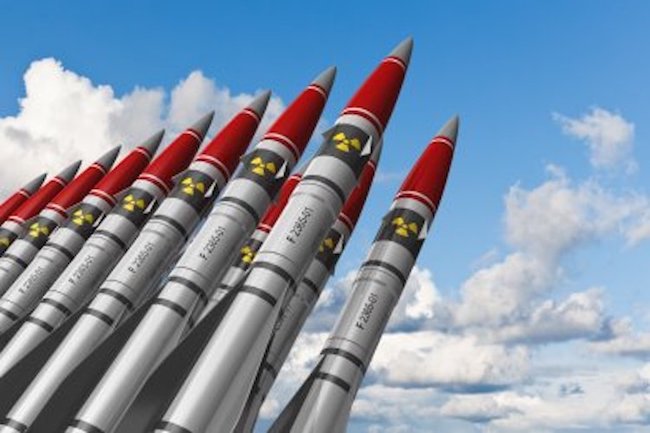
BERLIN (IDN | PNND) – Fifty Parliamentarians from 13 European countries have sent a letter today NATO Secretary-General Jens Stoltenberg and Chair of the OSCE Minister Sebastian Kurz, urging these two key European security organizations to pursue dialogue, détente and nuclear risk reduction in Europe.
The letter on July 14 also calls on NATO and OSCE (the Organization for Security and Co-operation in Europe) to support the multilateral process for nuclear disarmament through the Non-Proliferation Treaty and the United Nations. OSCE is the world’s largest security-oriented intergovernmental organization. Its mandate includes issues such as arms control, promotion of human rights, freedom of the press, and fair elections.
NATO, OSCE Asked to Pursue Nuclear Disarmament in EuropeRead More »
Finally, Nuclear Weapons Are Outlawed
By Jayantha Dhanapala*
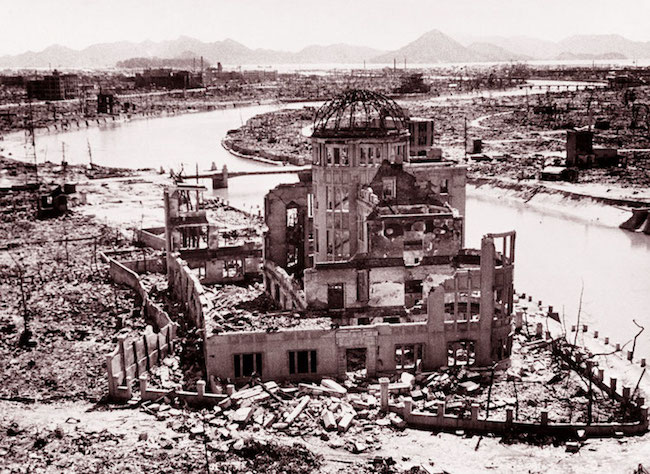
KANDY, Sri Lanka (IDN) – On July 7 2017, seventy two years after the most inhumanely destructive weapon was invented and used on hapless Hiroshima and Nagasaki, a Conference of the majority of member states in the United Nations decided – by a vote of 122 for; one abstention: and one against – to adopt a Treaty for the Prohibition of Nuclear Weapons.
It had been a long journey from January 1946 when the newly established United Nations Organization, located temporarily in London, adopted its very first resolution calling for nuclear disarmament signifying the undisputed priority of this issue. Since then, at every session of the UN General Assembly, resolutions with various nuances on nuclear disarmament were adopted with varying majorities. [P 12] SPANISH | JAPANESE TEXT VERSON PDF|
Finally, Nuclear Weapons Are OutlawedRead More »
A Landmark Achievement for Nuclear Disarmament
By Sergio Duarte, Ambassador, former High Representative of the UN for Disarmament Affairs*
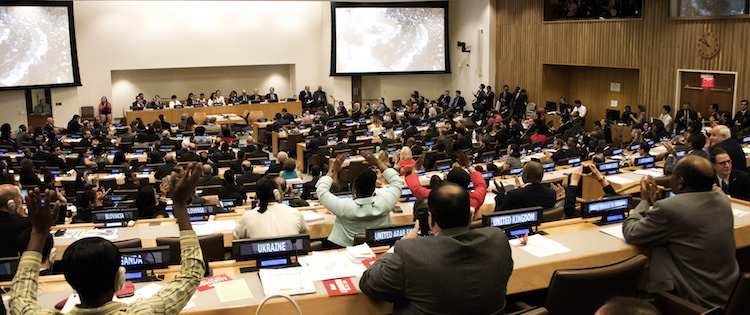
UNITED NATIONS (IDN) – A large majority of the international community, together with governmental and non-governmental organizations and institutions, achieved an important milestone in the treatment of disarmament questions by concluding a landmark Treaty on the Prohibition of Nuclear Weapons. The instrument was adopted on July 7, 2017 by 122 votes in favor, 1 against (Netherlands) and 1 abstention (Singapore).
Between March 15 to 31 and June 17 to July 7 the United Nations Conference negotiated a legally binding instrument for the prohibition of nuclear weapons leading to their elimination, in accordance with the mandate contained in General Assembly of Resolution 71/258 of December 23 2016. Participants benefitted from several years of studies, proposals and initiatives taken by States, academic institutions and organizations of the civil society on means to achieve the complete elimination of nuclear weapons. [P 11] | JAPANESE TEXT VERSON PDF|SPANISH
A Landmark Achievement for Nuclear DisarmamentRead More »
Civil Society Rejoices at the New UN Treaty Marking the Beginning of the End of Nuclear Age
By Ramesh Jaura
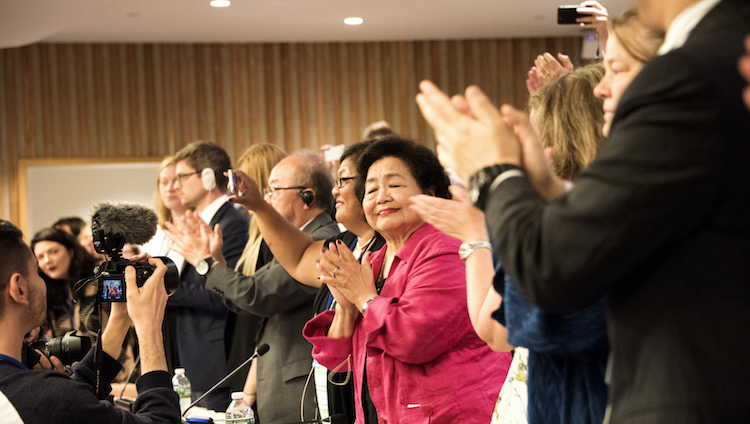
UNITED NATIONS (IDN) – When the United Nations member states adopted on July 7, 2017 a legally-binding treaty banning nuclear weapons and prohibiting a full range of related activities, it was a historic and highly emotional moment not only for Ambassador Elayne Whyte Gómez of Costa Rica, president of the UN conference. It was also a moment of profound rejoicing for a diverse range of civil society organisations (CSOs).
Twenty-five years after UN Secretary-General Boutros Boutros-Ghali opened the doors for the CSOs and other non-governmental organisations (NGOs) to contribute to the success of the Earth Summit in June 1992 that stressed the inexorable link between environment and development, the CSOs have successfully exercised their ‘soft power’ to help usher in a world free of nuclear weapons. [P 10] | JAPANESE TEXT VERSON PDF|SPANISH
Faith Groups Urge Universal Adoption of UN Nuclear Ban Treaty
By Jamshed Baruah
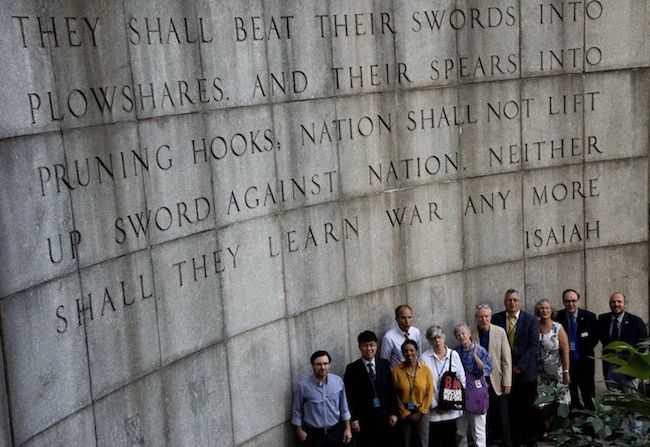
UNITED NATIONS (IDN) – While welcoming the adoption of the United Nations Treaty on the Prohibition of Nuclear Weapons “as a vital step toward the goal of a world free from nuclear weapons”, Faith Communities Concerned about Nuclear Weapons have in a ‘public statement’ called for its universal acceptance and implementation.
The Treaty, adopted on July 7, 2017 at the UN Headquarters in New York, lays out detailed provisions stipulating a comprehensive ban on the development, production, possession, stockpiling, testing, use or threat of use of nuclear weapons. It is the result of intensive negotiations at the UN involving more than 120 governments and many civil society representatives. [P 09] GERMAN | JAPANESE TEXT VERSON PDF|SPANISH
Faith Groups Urge Universal Adoption of UN Nuclear Ban TreatyRead More »
More Articles...
- 1. The Challenge of Nuclear Submarine Proliferation
- 2. Mayors for Peace Say the Danger of Nuclear War Is Real and Growing
- 3. Middle East Nuclear-Weapons-Free Zone, Long Elusive, is Making Progress, say Experts
- 4. Die Eliminierung von Interkontinentalraketen würde die Chancen eines globalen nuklearen Holocaust erheblich verringern
- 5. Elimination of ICBMs Would Greatly Reduce the Chances of a Global Nuclear Holocaust
Search
Newsletter
Report & Newsletter
Toward a World Without Nuclear Weapons 2022






